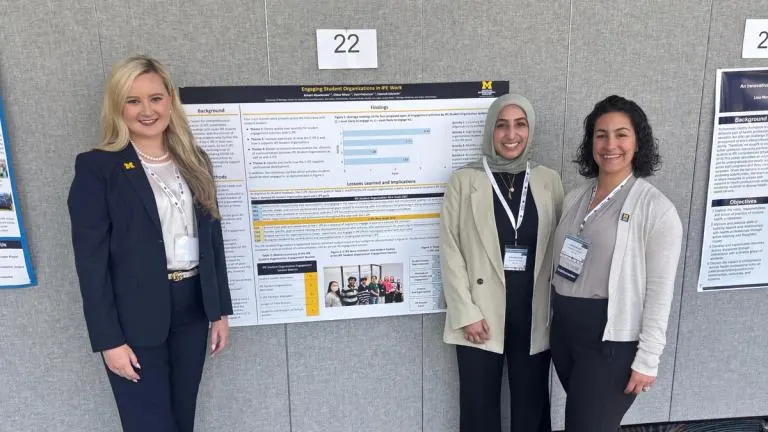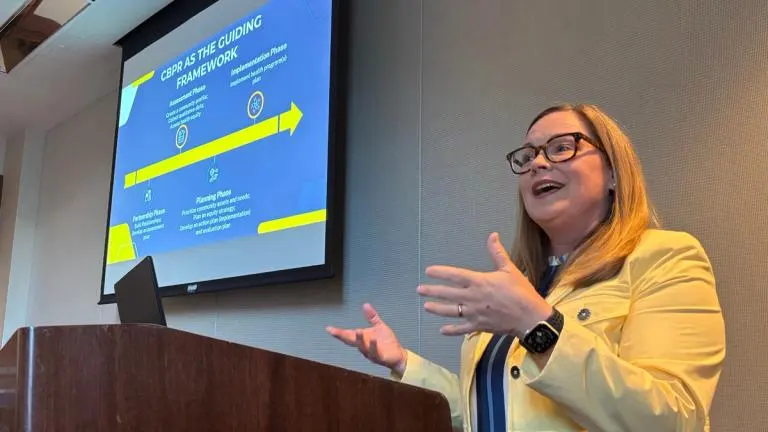The University of Michigan’s Center for Interprofessional Education (CIPE) brought energy, innovation, and a clear leadership presence to the 2025 Collaborating Across Borders IX (CAB IX) conference this May. Representing a wide range of disciplines, campuses, and educational approaches, CIPE team members delivered an impressive series of presentations and workshops that positioned U-M as a front-runner in interprofessional education (IPE) on the national stage.
Among the many highlights was Grace Kanzawa-Lee’s presentation, “TEAMS REFLECT: A Framework-Derived Tool for Interprofessional Debriefing After Experiential Interprofessional Activities,” co-authored by Hannah Edwards, Chloe Miwa, Kathryn Vanderboll, Amani Abuelenain, LaToya Brown, Michael Brenner, and Rajesh Mangrulkar. This work drew a full room and generated thoughtful discussion from colleagues across the international IPE community. Building on the TEAMS (Teams Engaging to Acquire Meaningful Skills) model adapted from University of Toronto’s Flexible Activities, the team introduced a new tool for structured student debriefing after interprofessional field experiences.
Furthermore, Kanzawa-Lee, a clinical assistant professor in the U-M School of Nursing, shared how the model encourages students to reflect on real-world team dynamics and develop skills that will serve them in future collaborative care settings. “The TEAMS activities help students be really intentional and reflective while shadowing other health professionals, analyzing interprofessional team interactions, and engaging in actual interprofessional teams to provide the best care possible to patients,” said Kanzawa-Lee. “Many studies show how important debriefing is; but up to this point, the studies have mostly focused on debriefing after simulated IPE experiences rather than real-world experiences.” The level of interest in the TEAMS model reflected a shared sense of momentum around rethinking how debriefing can strengthen experiential learning across disciplines.

Another moment of strong engagement came with the oral presentation, “Bridging Leadership and Conflict Styles in Interprofessional Education: Baseline Insights from Health Science Students,” delivered by Hannah Edwards and Amani Abuelenain. Their work explored how early-stage health science students approach team dynamics by examining connections between leadership and conflict styles. The study identified meaningful trends across disciplines, including a high prevalence of supportive leadership styles and the use of compromising conflict resolution. This emerging work hints at a powerful edge for U-M in shaping how leadership is cultivated through IPE, particularly in how we prepare students to lead collaboratively in complex, team-based care environments.
Michael Brenner, an associate professor in the Department of Otolaryngology–Head and Neck Surgery at U-M, anchored much of the Center’s presence at the conference through five separate presentations. His work spanned essential topics, from empowering learners through clinical IPE rotations to improving communication in high-noise operating rooms. His sessions also addressed airway safety, patient perspectives, and collaborative practice innovations, all focused on improving care through team-based approaches. His co-authored role in the TEAMS REFLECT project added further strength to the Center’s showing.

In addition to individual presentations, the CIPE team led several well-attended workshops that engaged participants in strategy building and shared learning:
- “Exploring the Need for an Approach for External Reviews of Centers/institutes/initiatives in IPE/IPP” by Rajesh Mangrulkar, Vani Patterson, Lynne Sinclair, and Stella Ng
- “Partnering with Health Systems on Collaborative Practice: IPE as Transformational Change” by Rajesh Mangrulkar, Vani Patterson, and Chloe Miwa
- “Building Sustainable Community Health Partnerships: An Interactive Workshop with the U-M Interprofessional Toolkit” by Amy Buckenmeyer, Hannah Edwards, Amani Abuelenain, Caitlin Ferguson, Chloe Miwa, Kathryn Vanderboll, and Michelle Pardee
Each of these sessions reflected the range of collaborative work happening across the University of Michigan and highlighted our capacity to support both academic and community-based interprofessional partnerships. The CIPE team also presented multiple posters at the conference, ranging from promising pilot innovations to A.I. in interprofessional education and practice:
- "Engaging Student Organizations in IPE Work" by Amani Abuelenain, Chloe Miwa, Vani Patterson, and Hannah Edwards
- "Pathways in Health: Professional Meet and Greet Exploration – an Innovative Pilot Interprofessional Opportunity for Undergraduate Pre-health Learners" by Lisa Martin, Vani Patterson, Emily Youatt, Kristin Klein, Hannah Edwards, and Laura Richardson
- "Piloting TEAMS Activities: Observing and Analyzing Healthcare Interprofessional Teamwork Among Undergraduate Nursing Students" by LaToya Brown, Sue Wintermeyer-Pingel, Michelle Pardee, Amy Buckenmeyer, Grace Kanzawa-Lee, Nicole Smith, and Hannah Edwards
- "Weaving AI into Interprofessional Practice and Education: Perspectives from Big Ten Institutions and a Call to Collaborate" by Devin Nickol, Rajesh Mangrulkar, and Kelly Karpa
The 2025 CAB IX conference offered a valuable opportunity for the CIPE team to share its growing body of work and connect with peers advancing similar efforts. Whether through new tools for experiential learning, emerging research on leadership development, or practical strategies for system-level change, CIPE’s contributions were grounded, thoughtful, and widely recognized by colleagues across the field.
